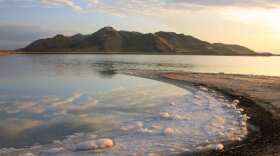-
This week Eating the Past continues its exploration of the fascinating history of plant based eating.
-
Utah lawmakers passed a bill that would prevent Great Salt Lake from qualifying for legal personhood, barring government entities from recognizing that nonhumans--like the lake--have legal standing. Join Tom Williams and panelists for discussion on this topic on this Great Salt Lake special.
-
Darren Parry, the former chairman of the Shoshone tribe, explains how Thanksgiving can serve as a reevaluation of values.
-
Hundreds of people gathered at the Bear River Massacre site to plant trees and plants that were once sacred to the area. They came to heal the land, to offer some retribution for those whose bones had once littered some of these same grounds.
-
When he came into the StoryCorps booth with Ann Norman, Darren Parry talked about the early Shoshone and the part his grandmother played in the history of the Bear River Massacre.
-
Specialty crops join communities of refugees, inmates, farmers, gardeners, urban growers, innovators, young and old. We hope all of these voices have inspired you to get your hands in the soil and pay a visit to your local farmer wherever you are.
-
This is a special presentation of a panel discussion on the agency and rights of the Great Salt Lake. It featured Sarah Woodbury, Darren Parry, Chandler Rosenburg, Janice Gardner, and Carter Williams.
-
The Northwestern Band of the Shoshone Nation commemorated the Bear River Massacre over the weekend. Despite strong winds and poor road conditions, the event drew a sizable crowd.
-
How do we heal from the traumas of the past, without forgetting the events that happened? Today on Access Utah we explore the Hyrum City Museum's newest exhibit and ongoing events commemorating the 159th anniversary of the US Army’s massacre of Shoshone at Boa Ogoi.
-
Storytelling is vital to many Indigenous cultures, but preserving oral traditions can be challengingHumans share knowledge through storytelling – historians retell the events of the past, scientists present narratives of their experiments. For many…

Play Live Radio
Next Up:
0:00
0:00
Available On Air Stations










